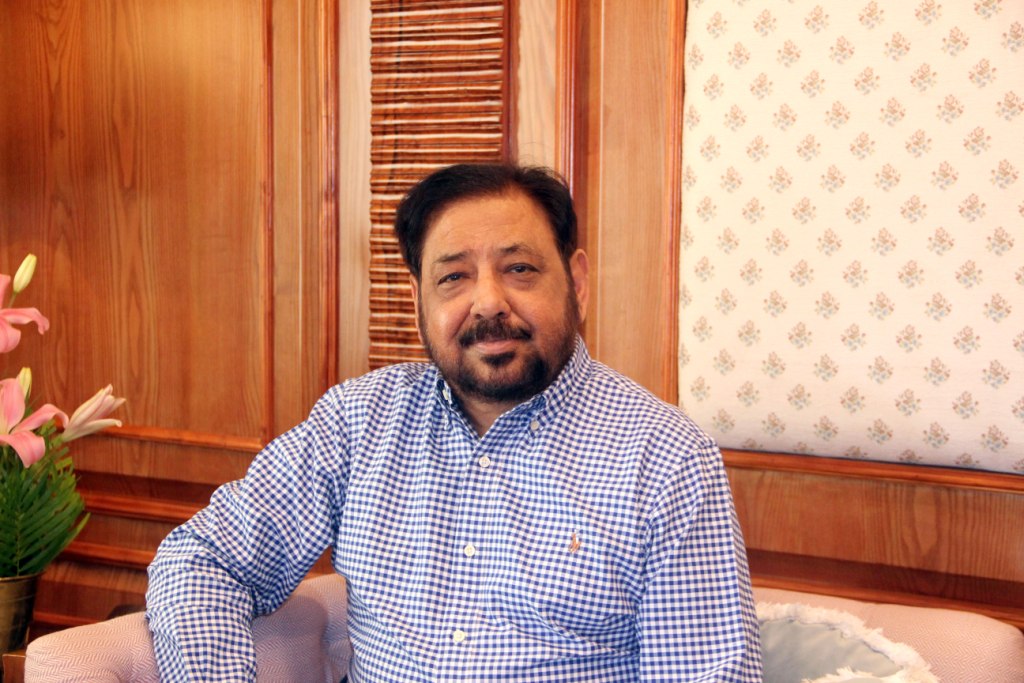Insights from Hoteliers on the Budget Expectation 2024-25
Industry experts sharing views on budget expectation 2024-25.


Mehul Sharma
Founder & CEO, Signum Hotels and Resorts
‘The hotel sector, a cornerstone of hospitality, is looking to the budget for a hearty serving of fiscal goodies. There’s chatter about the possibility of reduced GST rates, which currently sit like an uninvited guest at a wedding feast, eating into profits. Moreover, the industry advocates for a smorgasbord of financing options, including the extension of the Emergency Credit Line Guarantee Scheme (ECLGS) to help them recover from the pandemic-induced financial hangover. We also expect the – Subsidized loans for hotel construction and renovation; Enhanced depreciation on hotel buildings to encourage refurbishment and Tax holidays for new projects, especially in less explored regions. “Infrastructure status” for the hotel industry is badly required. More support to the new hotel brands in terms of lower lending rates and more services is needed.
A reduction in food licensing fees is one of the highly anticipated garnishes along with easier compliance norms that don’t leave a bitter aftertaste. Streamlining of multiple licenses into a single-window system, incentives for adopting digital payment systems, and initiatives to support local food industries and farm-to-table supply chains are need of the hour. There is a strong desire for infrastructure development funds that could connect the lesser-known jewels of India’s tourism crown. Additionally, there’s a call for marketing grants to put India on the global map as the go-to destination; after all, even the most exotic destinations need a good PR strategy. Investment in improving connectivity to offbeat destinations, boosting the ‘Incredible India’ campaign to attract international tourists, Implementation of the Prasaad Scheme and Special attention to heritage sites for conservation and tourism development.
Last but not least, there needs to be a two-way channel of communication between the Ministry of Tourism & Hotel fraternity to explore ideas and opportunities to grow together.’
Colonel Manbeer Choudhary
Chairman and Managing Director, Jewel Classic Hotels Pvt. Ltd
It is time to push a reform in the Indian hospitality industry which can only be accelerated by definitive inclusions and considerations in the upcoming budget. Climate change is a monstrous issue, offering incentive for eco-friendly and sustainable practices could be a huge boost for not just the industry but also for building a better future. With India setting an example for the world in environmental leadership in the wake of the G20 Summit, this could be another milestone move by this visionary government. India is a vibrant and culturally rich attraction for tourists from across the world but still is lagging behind when it comes to converting number of foreign tourists visiting. Empowering moves like GST relaxation from 18% to 5% for hotel industry, tourist site development, infrastructure development, etc are a necessity to boost the industry and get more foreign tourists business. Infrastructure status is desired for the hospitality industry for easier finance and banking support needed for growth. The hospitality industry is one of the biggest employers in the country and support through this union budget would translate into considerable contribution towards the economic development that this government has envisioned for the nation.


Dr. Vikram Kamat
Founder and CMD, The VITSKamats Group
The biggest expectation is to introduce input credit on Restaurant and f and b business because organized restaurant players are losing out a lot, and as the chain grows and creates formal employment and business for registered vendors still we are at a loss. And food is served everywhere right from the bus stand to the airport to up in the air or the trains. So it’s a huge loss to govt and industry both.
Jimmy Mistry
Chairman & Founder of Della Group
“I think India’s time has come to dominate the world in hospitality and leap from the front. It’s taken too long, but when you connect the dots, it couldn’t be a more appropriate opportune time when the India shining story is a reality. The Indian hospitality sector has seen unprecedented growth post-COVID. There are certain tweaks and changes that the Indian government needs to do to support and make hospitality grow exponentially. The way India leapfrogged in telecom somewhere in the 80s and 90s, it’s my prediction is India is going to leapfrog in the world of hospitality, not just within India, but Indian hospitality on a global platform will leapfrog with unprecedented growth.
Indians like Shivdasani have created amazing brands like Six Senses and Soneva, and have shown the world what capability Indians possess in hospitality and the mantra Atithi Devo Bhava. Adding to this illustrious list is Deepak Hori, ex-Labua, Bangkok, a pioneer in food and beverage. He has been instrumental in glamorizing the sector with Michelin-starred restaurants, making it the cutting edge in experiential hospitality. With Ayodhya rocking in tourism and hospitality and religious tourism becoming the next big thing in the country, brands like ours, Della Resorts, will lead the way with disruption in the world of experiential hospitality that we pioneered in India for the last decade. We ourselves are on a rollout to come up with theme-based, concept-based hospitality, experiential hospitality setups across the country.
The Indian government can definitely give heat to extending term loan tenures with altering RBI regulations, standard term loans, tenure to be extended to 20 years from the current tenures. Lowering of GST would definitely give an impact to the hospitality sector. Apart from this, single window clearances, improvisation in excise policy and implementation thereof, discarding some of the archaic laws present around the hospitality sector and excise in particular, would really help transform and support the Indian hospitality entrepreneur and brands present worldwide.”


Zubin Saxena
Senior Vice President and Country Head, India – Hilton
“As we approach the upcoming budget, we hope to see policies that can drive strong growth in the hospitality sector.
A pivotal requirement is a tax overhaul, specifically a significant reduction in the GST rate for hotels from the existing regime. This isn’t just about conforming to global standards; it’s about positioning ourselves ahead of rivals like Thailand and Singapore, making our country more appealing to tourists. Simultaneously, there’s a firm expectation for an industry wide infrastructure status for the hospitality sector. Tourism, development, and economic growth go hand in hand and our country has several gems of places which once developed, will see exponential growth with the employment boost and socio-economic development. This move brings tangible benefits such as lower utility tariffs, reduced property tax, improved financial access, and a more favourable business environment.
We also look forward to ease of doing business, providing developers within the sector with economic incentives & subsidies geared towards the sectoral growth. India’s hospitality sector when compared to the major lodging markets presents a huge opportunity. Also, being amongst the largest employment generators, the sector will be a key pillar to drive sustainable economic growth across the country. It’s imperative that the government strengthen these strides with clear and decisive policy announcements. These measures will be both desirable and essential for ensuring unwavering and dynamic growth in the industry. While acknowledging commendable initiatives like “Dekho Apna Desh and Visit India Year 2023 coupled with the very successful G20 Summit India hosted last year which in a manner was emblematic of our potential and aspirations, we look forward to the promise 2024 unfolds for all of us.
Navin Suchanti
Chairman, Sinclairs Hotels ltd.
Simplifying the complex GST structure in respect of hospitality industry and reducing the GST from 18 percent to a globally competitive 12 percent is imperative for long term growth. The entire expenditure in respect of hotel buildings should be eligible for input credit of GST paid for the raw materials.
In addition, considering the employment potential of the sector, the industry should be granted infrastructure status. A PLI scheme for new hotels and resorts should also be seriously considered by the Government.


Raoof Dhanani
Managing Director, Sayaji Hotels Ltd
As the budget unfolds, anticipation mounts for transformative shifts. From liberating hotels under Section 269ST to incentivizing renovations via Section 35AD, and broadening LTA to cover hotel expenses, it will all act as the beacons of progress. Further, amplifying green energy initiatives by the State Electricity Boards, fund releases for SEIS licenses, and the expansion of Rupay’s network will foster resilience and creativity and pave the way for inclusive growth and innovation across the hospitality sector.
Gaurav Shetty
Managing Director , MRG Group
“The upcoming Union Budget 2024-25 is of immense importance as the hospitality industry has recovered from the setback caused by the pandemic and now is expected to grow manifolds in 2024. The present government has been making a lot of efforts for infrastructure improvement across the country, including highway development and strengthening regional air connectivity. We expect similar announcements in this year’s budget that will focus on improving infrastructure in tier-II and tier-III cities of India. The hospitality industry has been advocating for infrastructure status for many years now and I hope that the government considers this key demand in this financial year. An industry status will mean that hospitality companies will be able to avail benefits like capital and interest subsidies besides paying power tariff at industrial rates against the requirement of payment at much-higher commercial rates. This will help to reduce costs of hospitality projects which are capital intensive and thus encourage further investment in the sector.”


Varun Arora
CEO and Co-Founder of Ekostay, a homestay venture
“In the dynamic landscape of India’s hospitality sector, the forthcoming Budget 2024 holds profound significance. As we navigate the post-pandemic era, it is imperative to envision a budgetary framework that not only addresses immediate challenges but also lays down a visionary roadmap for sustainable growth.
Firstly, infrastructure remains the backbone of our industry. Enhancing connectivity through robust transportation networks, especially in emerging tourist destinations, will unlock unprecedented opportunities. Investments in modernizing airports, expanding railway connectivity, and improving road infrastructure can be transformative, ensuring seamless travel experiences for guests across the nation.
Moreover, the emphasis on sustainability cannot be understated. As global consciousness shifts towards eco-friendly practices, integrating green technologies within our establishments becomes paramount. Incentivizing renewable energy adoption, waste management solutions, and sustainable construction practices can position India as a leader in sustainable tourism, appealing to the conscientious millennial traveler.
Skilling and workforce development also warrant attention. The hospitality sector thrives on its people, and nurturing talent through specialized training programs, especially in digital proficiency and guest experience management, will enhance service standards. Collaboration with educational institutions to introduce industry-relevant curricula can further bridge the skill gap, ensuring that our workforce is future-ready.
Furthermore, digital transformation remains a pivotal catalyst for growth. With the millennial demographic driving travel trends, leveraging technology to enhance guest experiences—from AI-driven personalization to seamless digital bookings—is no longer a luxury but a necessity. Encouraging investments in cutting-edge technologies and fostering innovation hubs can spur a wave of tech-driven solutions tailored for the modern traveler.
Lastly, recognizing the symbiotic relationship between tourism and local communities is crucial. Initiatives that promote cultural exchange, heritage preservation, and community-based tourism can create a more inclusive and enriching travel landscape.
In conclusion, as stakeholders in India’s vibrant hospitality ecosystem, we remain optimistic and look forward to Budget 2024 ushering in policies that catalyze innovation, foster sustainability, and champion inclusivity. Together, let’s co-create a future where India’s hospitality sector shines as a beacon of excellence, resilience, and growth.”
Aditya Sanghi
Co-founder and CEO, Hotelogix
“The Indian hotel industry is poised for substantial growth in 2024 and beyond. To fully unlock its potential, it is imperative that the government extends its support in various crucial ways. A pivotal step would be to accord the industry the much-awaited infrastructure status, accompanied by a reduction in GST rates. This dual approach will significantly enhance the industry’s accessibility to secure financing for expansion and development. Furthermore, in alignment with international best practices, the government should consider introducing an incentive program akin to Singapore’s “Productivity and Innovation Credit.” This initiative would provide substantial tax relief to hotels that invest in operation-critical solutions, such as a Hotel Property Management System (Hotel PMS), Channel Manager, Revenue Management System, Guest-facing Contactless Solution, and other technology-driven tools. This forward-thinking approach will incentivize hotels to embrace technology and empower them to drive growth, elevate guest experiences, and ensure adherence to regulatory standards and requirements. Such measures will fuel the industry’s growth and position India as a competitive player in the global hospitality landscape.”


Kahraman Yigit
Co-Founder and CEO – Olive by Embassy
“India’s 2024 budget should prioritize revitalizing the hospitality sector, emphasizing sustainable tourism and infrastructure development. Incentives for digital innovation and skill training are vital to cater to the post-pandemic era’s demands, ensuring long-term industry resilience and job creation.”
Namit Vijh
Cluster General Manager Rajasthan & Agra, Radisson Hotel Group, and General Manager Radisson Gurugram, Udyog Vihar
As we eagerly await the 2024 Budget, our expectations focus on enhancing infrastructure in leisure destinations and aggressively promoting India’s tourism with a robust international marketing campaign. Additionally, we look forward to increased support for our hospitality industry, building on the government’s commitment over the years. It’s like setting the stage for a magical journey that welcomes the world!


Utsa Majumder
General Manager of Hyatt Regency Dharamshala Resort
As we anticipate the challenges & opportunities of the upcoming year, financial planning will be pivotal in steering the course for success. It is imperative that we strategically target and increase the total revenue by aligning with industry trends and leveraging our past performance data. The budget expectation for 2024 is more than a set of numbers, it is a strategic roadmap that will guide us towards achieving our goals.
Vinesh Gupta
General Manager,The Den, Benagluru
“Positioning tourism as the second-largest foreign exchange contributor in India underscores its economic significance. Enhancing its resilience involves granting industry status to hospitality and tourism. Facilitating seamless, duty-free imports, coupled with reinstating incentives for dollar earnings, as previously endorsed by the government, is imperative for sustained growth.”


Vishal Kamat
Executive Director, Kamat Hotels India Ltd
“Our industry plays a vital role in the nation’s growth, especially in light of PM Narendra Modi’s vision for a 10 trillion economy. To achieve this, we need robust sports infrastructure. However, the current government projects like the Ayodhya temple highlight the mismatch between visionary plans and infrastructure support. We require better tourism facilities – from grassroots to luxury accommodations such as lodges, guesthouses, budget to 5-star hotels. Without proper industry support, we wouldn’t be able contribute to this common vision.”
Tejus Jose
Director of Operations, ibis and ibis Styles India
“As we eagerly anticipate the forthcoming budget, we recognize its pivotal role in fortifying India’s global standing as a premier destination for hospitality and tourism. The leisure, business, and MICE sectors are integral contributors to our nation’s allure, and it is imperative to focus concerted efforts on enhancing inbound tourism for a sustained revenue influx into the hospitality industry.
We advocate for a strategic alignment with government initiatives such as Swadesh Darshan and promotional campaigns like Dekho Apna Desh to amplify support for the domestic tourism sector. The success observed during significant events like India’s G20 presidency and the Cricket World Cup highlights the mutually beneficial relationship between such occasions and the thriving hospitality industry. We eagerly anticipate a continued stream of such events, further boosting annual tourist footfall, especially from the burgeoning Asia Pacific region.
Addressing the GST incongruity is paramount for fostering equitable growth within the hospitality sector. We strongly urge for parity in GST rates between standalone restaurants (5%) and hotel restaurants (18%), recognizing that this disparity adversely impacts our industry. A harmonized tax structure will undeniably contribute to a more resilient and competitive landscape within the hospitality and tourism sectors.
In conclusion, we look forward to a budget that not only acknowledges the significance of the hospitality industry in bolstering India’s global appeal but also takes concrete steps to create a conducive environment for sustainable growth and competition”


Satyabrata Sandha
Director Of Finance, Sheraton Grand Chennai Resort & Spa
“The 2024 Budget in India, amidst upcoming elections, is expected to focus on Capital Expenditure and manufacturing to spur economic growth. The interim budget in February, followed by a comprehensive one in July, will emphasize microeconomic stability and boost the hotel, travel, and tourism sectors, aligning with India’s growing role as a key travel destination and investment hub.”
Varun Mehrotra
Director of Sales and Marketing, Sheraton Grand Bengaluru Whitefield Hotel and Convention Center
The Indian Hospitality Sector is anticipated to have a promising 2024 and experience key innovative trends like redefining dining, menu visualization via VR, the rise of wellness & medical tourism and a consistent rise in RevPARs. With the nation witnessing a surge in domestic tourism: that ranges from leisure weekend getaways, sustainable wellness stays to grand weddings, large groups, MICE & meetings demands, domestic travel is flourishing further reinforcing the foundations of domestic tourism. In particular, our ‘Shaadi by Marriott Bonvoy’ services encapsulate the essence of luxury weddings, seamlessly blending tradition and modernity. This opportunity is a chance to share our unique vision for 2024, emphasizing the Sheraton Grand experience—where experiences transcend the ordinary, leaving an indelible mark on every guest/occasion we host.


Bijay Kumar
Director of Finance, Radisson Blu Hotel Pune Kharadi
In the 2024 budget, addressing the hindrance to India’s hospitality sector growth lies in unlocking GST credit for hotel construction. Rationalizing GST rates and enabling credit could make hotel stays more affordable, boosting tourism and attracting investments. Elevating rewards under SEIS and extending duty script validity for hotels incentivizes further investment. Granting industry status and lower interest rates would catalyze growth, positioning the hotel industry as a robust economic and cultural pillar in India. The upcoming Union Budget offers a unique chance to strengthen the tourism sector.
Mukul Punde
Director of Finance, Courtyard by Marriott Pune Chakan
“Enhancing synergy in the GST billing system is pivotal, creating a symbiotic ecosystem for seamless end-to-end PO to payment interfaces. This is indispensable to eliminate errors, prevent duplication of human effort, and expedite the reconciliation process.”
“Prioritizing allocations for uninterrupted energy supply to hotels is paramount, aiming to reduce dependence on fossil fuels. This strategic shift aligns with the goal of fostering a more sustainable and profitable business environment.”
“Advocating for a single-window approach for obtaining multiple licenses required for events, streamlining liaison with various organizations, vendors, and societies. This initiative significantly contributes to the ease of doing business.”
“Urging the government to reevaluate GST rates, particularly on hotel room tariffs exceeding INR 7,500. A reduction to 12 per cent from the current 18 per cent is deemed necessary, given the high competitiveness of the industry in the current scenario.”


Ramachandra Bhat
Director of Finance, Clarks Exotica
As anticipation builds for the Union Budget 2024, Mr. Ramachandra Bhat, the Director of Finance at Clarks Exotica Convention Resort & Spa, outlines key expectations that could significantly impact the Indian hospitality sector.
Addressing taxation, Mr. Bhat fervently supports a reduction in Goods and Services Tax (GST) rates on hotel room tariffs. Proposing a decrease from 18% to 12% for room tariffs exceeding INR 7,500, he contends this adjustment would enhance competitiveness and benefit both consumers and hotel businesses.
Foremost among his expectations is an increase in the income tax exemption slab for individuals. Proposing a new threshold of INR 10 lakhs, Mr. Bhat emphasizes the industry’s reliance on manpower, making this adjustment pivotal for the sector’s financial health.
In terms of employee benefits, Mr. Bhat advocates for an augmented House Rent Allowance (HRA) for Bangalore, suggesting an increase from the current 40% to 50%. Recognizing Bangalore as a fully grown city, he argues for metro-level consideration to attract and retain talent within the hospitality workforce.
Streamlining operational processes is a core focus for Mr. Bhat, who calls for a simplified, one-nation, one-license framework. He believes this reform would alleviate the burdensome process of obtaining municipal, state, and central licenses, fostering a more conducive environment for business initiation.
Highlighting broader industry concerns, Mr. Bhat stresses the necessity of a dedicated ministry for the hospitality sector. Such a ministry, he contends, would offer focused support crucial for sustaining growth, attracting investments, subsidies, and generating employment opportunities.
Additionally, he advocates for an annual Leave Travel Allowance (LTA) to encourage domestic tourism, departing from the current biennial cycle.
As the Union Budget 2024 approaches, these expectations reflect the sector’s aspirations for comprehensive policy adjustments that address immediate financial concerns and pave the way for sustainable and resilient growth.
CA. Nilamadhab Panda
AVP – F&A, MAYFAIR Hotels & Resorts
In a recent address, the Prime Minister urged citizens to choose domestic destinations for vacations and highlighted the appeal of hosting weddings in India. To bolster the hospitality industry, a proposal to reduce the GST rate from 18% to 12% was introduced. Additionally, there is a call for expanding personal tax relief by increasing standard deductions and raising the home loan interest rebate from Rs. 2 Lakhs to Rs. 5 Lakhs, aligning with the escalating costs of housing. These measures aim to make vacations and weddings within India more enticing and stimulate economic activity.

“The Union Budget of FY 2023-24 announced by FM Sitharaman proved instrumental in revitalising the hospitality industry and providing a lifeline during challenging times. Infrastructure investments bolstered accessibility to tourist destinations, enhancing the industry’s overall appeal and streamlined regulatory processes, facilitated ease of doing business and fostering entrepreneurship. The budget of FY 2023-24 acted as a catalyst for resilience and growth in the dynamic landscape of the hospitality sector. We anticipate a transformative Union Budget 2024-25, expecting targeted measures to fuel recovery and growth. Along with tax reforms, continued support for infrastructure development, and streamlined regulations to ease the burden on businesses, the industry looks forward to robust financial support, acknowledging the challenges posed by recent global events and focusing on Inbound travel. A reformative budget, targeting training and skill development, ensuring a resilient and competitive landscape. As the nation redefines its economic roadmap, the hospitality industry eagerly awaits policies that foster innovation, sustainability, and a flourishing tourism ecosystem.”
Saurabh Gahoi, Vice President, India, Ramee Group of Hotels
——
 English
English French
French German
German Italian
Italian




